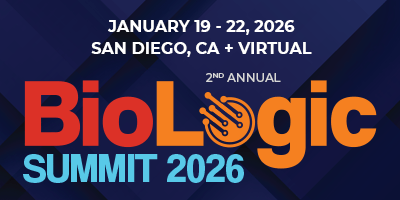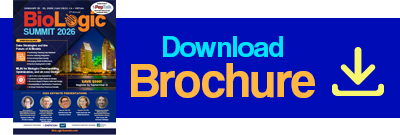Interactive Breakout Discussions
Engage in in-depth discussions with industry experts and your peers about the progress, trends, and challenges you face in implementing ML/AI in your work! Interactive discussion groups play an integral role in networking with potential collaborators, provide an opportunity to share examples from your work, and allow you to be part of a group problem-solving endeavor.
These will take place IN-PERSON ONLY.
DATA STRATEGIES AND THE FUTURE OF AI MODELS
WEDNESDAY, JANUARY 21 | 7:30-8:15 AM
TABLE 11: Comparing and Contrasting Machine Learning-Based Design of Antibody and Non-Antibody Biologics
Moderator: Jung-Eun (June) Shin, PhD, Senior Machine Learning Scientist, Seismic Therapeutic
- Public data availability and ease of screening designs and generating experimental data
- Deimmunization and humanization methods for antibodies vs. non-antibody biologics
- Computational and deep learning methods for functional engineering and de novo design
- Methods for developability predictions and multi-objective optimization
TABLE 12: Overcoming the Data Bottleneck in AI-Driven Antibody Engineering
Moderator: Roberto Spreafico, PhD, Vice President, Head, Discovery Data Science, Genmab
- Data scarcity as the key constraint to progress in antibody model development
- High-throughput assays: Current limitations and future potential
- Cross-disciplinary insights from medicinal chemistry and related domains
WEDNESDAY, JANUARY 21 | 4:50-5:40 PM
TABLE 1: Accelerating Antibody Engineering with AI-Driven Active Learning: Optimizing DMTA Cycles
Moderator: Jiangyan Feng, PhD, Senior Advisor, Biotechnology Discovery Research, Eli Lilly and Company
- Active learning strategies for antibody optimization
- Closing the loop: Integrating experimental feedback into ML models
- Multi-objective optimization in antibody DMTA
- Speed vs. thoroughness: Designing efficient DMTA cycles
TABLE 2: Best Practices for Using Agentic and Multi-Agent Systems in R&D
Moderator: Elahe Vedadi, PhD, Research Scientist, Google/DeepMind
- Strengths and limitations of the current systems
- Practical techniques to evaluate these systems
- Best practices for enabling agents to effectively utilize external tools and APIs
- Planning for complex problem decomposition and effective action sequencing
ML/AI FOR BIOLOGICS DEVELOPABILITY, OPTIMIZATION, AND DE NOVO DESIGN
WEDNESDAY, JANUARY 21 | 7:30-8:15 AM
TABLE 13: Language Models to Generate 3D Structures
Moderator: Possu Huang, PhD, Assistant Professor, Bioengineering, Stanford University
TABLE 14: Leveraging Large Language Models, Deep Learning, and Graph-Based Architectures to Accelerate Biological Design
Co-Moderators: Omar Abudayyeh, PhD, McGovern Fellow/Principal Investigator, Massachusetts Institute of Technology
Jonathan S. Gootenberg, PhD, McGovern Fellow/Principal Investigator, McGovern Institute, Massachusetts Institute of Technology
- Developing programmable tools across biological scales
- Creating EVOLVEpro, a few-shot active learning framework optimizing protein function using language models and targeted experimentation
- Developing virtual cell models predicting responses to genetic/chemical perturbations
- Applying these to map aging mechanisms through single-cell perturbation atlases, identifying factors restoring youthful cell states
- Demonstrating how machine learning can model biological complexity and accelerate therapeutic development
WEDNESDAY, JANUARY 21 | 4:50-5:40 PM
TABLE 3: Large-Scale Antibody Discovery Benchmarking Challenge #2
Co-Moderators: Andrew R.M. Bradbury, MD, PhD, CSO, Specifica, an IQVIA business
M. Frank Erasmus, PhD, Head, Bioinformatics, Specifica, an IQVIA business
- Review launch of the next phase of the AIntibody Competition Series, during which participants will have four months, using any method (in vivo immunization, in vitro techniques, or ML/AI) to generate human antibodies against targets to be revealed at the challenge's start
- Evaluate target affinity, developability (minimum score), and submission time
- Goals of the challenge include fostering innovation, expediting therapeutic antibody development, benchmarking capabilities, and providing insights into technology cost–benefit profiles transparently
TABLE 4: Structure-Guided Antibody and Immunogen Design
Moderator: Monica L. Fernandez-Quintero, PhD, Staff Scientist, Integrative Structural and Computational Biology Department, Scripps Research Institute
- Structural biology to map epitope footprints—how important is it still to define epitopes/paratopes experimentally for precise targeting—is AI already there?
- Structure prediction and computational design—machine learning or physics-based?
- Antibody challenges—structure prediction, dynamics, design, diversity, glycan shields, breadth
- When will we have an AI designed therapeutic/vaccine?










